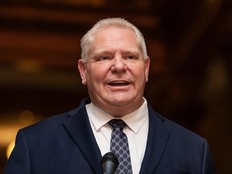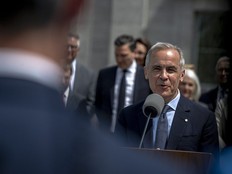Grady Munro
LATEST STORIES BY GRADY MUNRO
OPINION: Ford government failed to keep fiscal powder dry — now Ontarians will pay the price
The Ford government last week released its 2025 budget — it’s first since getting re-elected for a third term — and once again failed to balance the books, resulting in more borrowing and more debt on the backs of Ontarians.

OPINION: Five key issues — besides Trump tariffs — the Carney government should tackle
On Tuesday in Ottawa, Prime Minister Mark Carney unveiled his new cabinet, consisting of 28 ministers and 10 secretaries of state. They have their work cut out for them. In addition to President Donald Trump’s trade war, the Carney government must tackle several other critical issues that have persisted long before Trump was re-elected.

OPINION: Next government must work to strengthen national defence
Due to U.S. President Donald Trump’s trade war, Canada-U.S. relations are the central issue in the federal election. But a related issue — Canada’s national defence strategy — hasn’t received much attention. But it should.

OPINION: Voters should remember Canada has other problems beyond tariffs
Canadians will head to the polls on April 28 after Prime Minister Mark Carney called a snap federal election. As the candidates make their pitch to try and convince Canadians they’re best-suited to lead the country, U.S President Donald Trump’s tariffs will take centre stage. But, while the tariff issue is important, let’s not forget the other important issues Canadians face.

OPINION: Lowering taxes will help boost living standards for Canadians
According to a new poll from RBC, nearly half (48%) of Canadians can’t maintain their standard of living due to rising costs. These polling results should come as no surprise; recent research has shown Canadian living standards are in historic decline.

OPINION: Not a ‘vibecession’ — Canadian living standards are declining
During a recent press conference about the Trudeau government’s plan to send $250 cheques to many Canadians and suspend the GST on certain goods and services for two months, federal Finance Minister Chrystia Freeland said Canadians are experiencing a “vibecession,” which is creating negative feelings about the economy despite “really positive economic news.” According to Freeland, these two proposals, which will cost billions, will “help Canadians get past that vibecession.” In reality, the economic woes of Canadians are real and new data from Statistics Canada shows that Canadian living standards are declining. Let’s look at the numbers. From July to September 2024, after adjusting for inflation, the Canadian economy (as measured by Gross Domestic Product) grew by 0.3%, yet per-person GDP (an indicator of living standards and incomes) actually fell by 0.4%. How can the economy grow while living standards decline? Canada’s rapid population growth, fuelled by high levels of immigration, means the overall economy has increased in size but per-person GDP has not. During the same three-month period (July to September), Canada’s population increased by 0.6% (or 250,229 people), outpacing the rate of economic growth. Not merely a one-off, this continues a historic decline in Canadian living standards over the last five years. In June 2019, inflation-adjusted per-person GDP was $59,905 compared to $58,601 in September 2024, a decline of 2.2%. And while per-person GDP has ebbed and flowed during this decline, the third quarter of 2024 marks the sixth consecutive quarter that living standards have fallen in Canada. Last week, the House of Commons approved the government’s plan to temporarily suspend the GST on select items from Dec. 14 to Feb. 15, at an estimated cost of $1.6 billion (the legislation now goes to the Senate for approval). The government has delayed the “$250 cheques” plan to potentially accommodate NDP demands to expand eligibility to include seniors (the original proposal would have sent cheques to an estimated 18.7 million Canadians at a cost of $4.7 billion). Neither one of these proposals will incentivize Canadians to work and invest; therefore these proposals won’t help raise living standards. To help drive economic growth, create jobs and provide more economic opportunities for workers across the income spectrum, the federal government should reduce the overall tax burden on workers and businesses, and make Canada a more attractive place to work and invest. Despite any claims of a “vibecession,” Canadians remain mired in an actual recession in their standard of living. Freeland’s comments once again prove this government is disconnected from the reality many Canadians face. It’s not just bad vibes — the data shows Canadians are actually worse off today than they were in 2019. Jake Fuss and Grady Munro are analysts at the Fraser Institute



